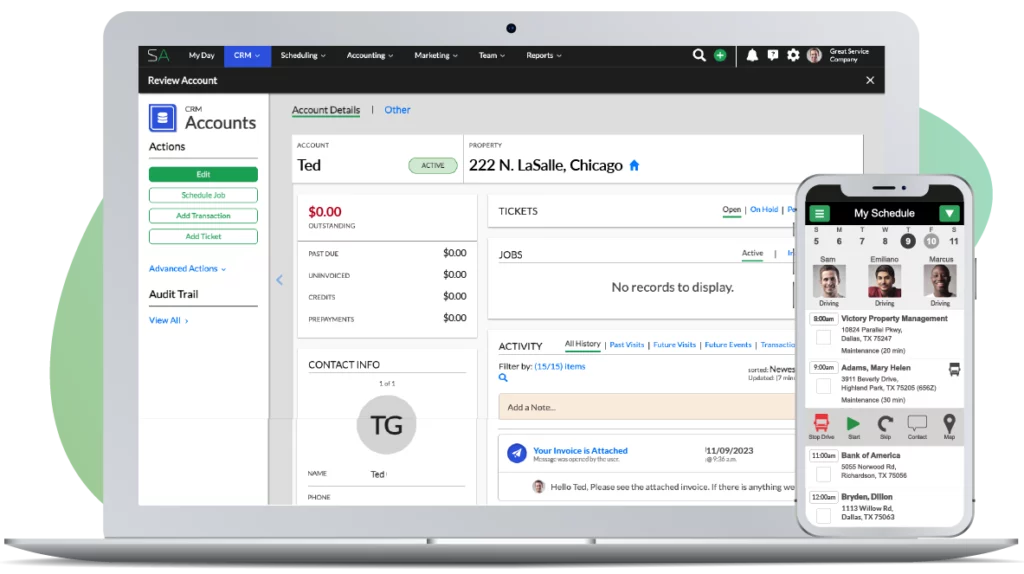Do you pay yourself too much or too little to run your lawn care & landscape business?
And… what is the maximum salary you should pay yourself?
Watch the video above and find out.
This is a good question from Tony.
How much should I pay myself? What percentage of our revenue should go towards our salary?
He says, “My question is simple but I haven’t seen it asked before. I have partnered with my boss and we are in the planning stage of our lawn care company. We work for a Forbes 200 company as managers. We’ll be adopting many of the same processes we use here at our company. My question is this: What is the percentage range we should be putting toward our salary? I know the goal is 20% net profit. In saying that, what is the percentage a sole proprietor partnership should be looking to pay themselves? Thank you for your time.”
So, there’s a couple of things weaved into this one question here that I think is worth addressing. Let’s start with the salary range. I don’t think there’s a magic answer to this one. I’m sure somebody has an answer but everybody makes up answers to everything. So, I haven’t the faintest idea.
I’ve started a bunch of companies and, in my case for a number of them, I haven’t been paid at all for some period of time. In the software company, I think it was 3 1/2 years that I never got a cent. I just put money in. And so obviously, that’s not the road that most people can travel, or maybe shouldn’t travel. So, the real question is not how much should you pay yourself but, how fast do you want to accelerate the thing that you’re trying to build?
The reason why in my case I haven’t taken money out of some businesses for some period of time, and why in some cases I’ve put money in, is because I wanted to grow the businesses faster. In the case of my lawn care company, we just put some money in to get it started and never put money in again. We didn’t know enough to go faster. So that was our problem there. I think that tends to be the case with most guys who want to raise money. It would do them no good because they don’t know what they don’t know yet. You just have to get in and learn the business, the industry, and what clients want. Adding money to that doesn’t solve the problem.
And so, where I’m going with that is, that same concept that I didn’t take money in the beginning because I wanted to put all the money back into the business to grow a little bit faster, applies in a different way to you.
I don’t think there’s a percentage because I could say, “well, you know, you should take 5% of your gross revenue and put that towards your salary.” But, that’s meaningless because if you have no money left over, you can’t take 5%. And, if you have tons of money left over, now you have the consideration of, do I take more than 5% of gross revenue as my salary? By the way, I totally made up that 5% number, so don’t go off that at all.
But, my point there is if now you have money left over and you have more than 5% of gross revenue left over. Let’s put math to this. Let’s say you do $500,000, 5% means you only make $25,000. You should make more than $25,000 in pay off of your $500,000 business.
But, let’s say you have a $100,000 left over of the $500,000. Now you have a decision. You could take all the $100,000. There’s nothing wrong with that. It’s your business. You created it to become a profit machine. In that case, that’s 20% of your revenue that could go towards your salary.
And so, again, I’m being simplistic here. We’re not talking about profit. We’re just talking about money that you can take as a salary. But, your decision is, would you rather take $25,000 of that and put $75,000 back into the business? Maybe your goal is to get it to $1 million next year.
This is the constant consideration in everything you’ll do no matter what stage you get to in your business. It will always be, how can you best utilize your pile of money? Is it best to take it off the table and put it in your personal bank account and maybe invest it personally? Or, is it best to put that money back into the business?
The thing that I don’t think most people think about is, we’re building assets. For most of us, our wealth is going to be in our businesses. It’s not going to be in equities that we are buying, or real estate, or other investments that we’re making. Our biggest asset is going to be in this company. So, you have to think in terms of utilization of your money.
I’m going slightly off topic on you here but, I think this is how you make the decision. I can’t give you a percentage. So, you need to make the decision on what the minimum is you and your family can live with. You and your boss have to answer that. Your boss who’s about to be your partner. And, by the way, you need to make sure that as soon as you’re partners, you no longer think of him as your boss. You have to get away from that mindset.
So, now back to the real question. What’s the minimum amount that you can live on? I would recommend that you live as frugally as you can for three years. I’d say more if you want to be more aggressive. Your attitude has to be that you’re making an investment in the company because it will change the course of your life and your family’s life, forever. You’re going to give up a lot of stuff for three years and take as little money as you can and you put as much back in so that you can get the business bigger faster.
There is no magic here. If you want to grow a big business fast, it takes money. And if you don’t give it the money, you don’t grow a big business fast. And so, you’re going to have to take less money up front so that you can have big money later. There’s no question about it.
If you guys get to a point where you just flat out don’t know how to make your business better, then you might as well take all the money out and quit putting money into the thing. Just let it grow organically at its own speed because you’re dumping money into it and it’s doing you no good.
And once you reach a point where there’s enough money left that you could take a pretty large salary, in the six figures, then what I think you do based on the accounting advice I’ve received over years, and you need to double check all of this for yourself, is you pay yourself a salary that is equivalent to what you could go hire somebody else for to fill your shoes.
So for example, if you’re the president of the company and you’re running a $5 million company, let’s say you could go hire somebody with a lot of experience to become president of your company for $120,000 a year, hypothetically. Well then, in that case, you should probably be paying yourself $120,000 a year. You should pay yourself what it would cost to replace you.
The remainder of the money left over in the company thereafter is what I would call profit. The remainder of that money then can either be reinvested or can be distributed to the owners of the company.
Remember, my point was, that once you reach a point where you could really afford to pay yourself quite a bit and still leave money in the company to grow it, then, at that point you cap your salary at a number that it would cost you to bring somebody in to replace you and then, the remainder is considered profit.
And that’s the way I look at it, and that’s the tax advice that I’ve been given over the years. And, again, you would double check that for yourself.
My final point in response to your question is, you made the mention that your goal is 20% net profit. I would just mention to you that I don’t think 20% net profit is generally achievable in the commercial space unless you’re running a fairly small business. That used to be the case, but things have really changed. So, if your goal is 20% net profit, you need to, in my opinion, have a heavy residential element to the business. You’ve got to be very strategic about it to achieve that. But you can achieve it more likely, I believe, in a big residential company which is a little more challenging to build.
Good luck!
Podcast: Play in new window | Download
Subscribe: RSS




One Reply to “How Much Should You Pay Yourself?”
Many of us start doing it part time as a summer job growing up.
When overgrowth occurs, you have plants that would normally be benefiting bodies
of water sucking up all the oxygen, not leaving enough for fish and other beneficial natural life.
The second thing I would suggest is adjust your cultural practices such as mowing and watering techniques.